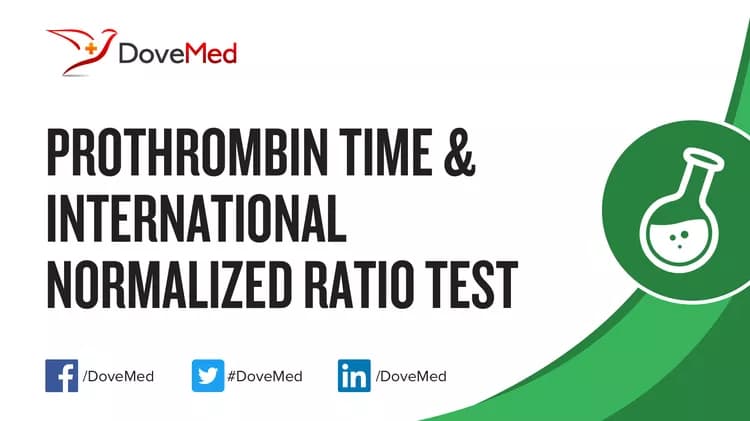
Prothrombin Time & International Normalized Ratio Test
What are the other Names for this Test? (Equivalent Terms)
- INR Test
- International Normalized Ratio (INR) Test
- PT/INR Test
What is Prothrombin Time & International Normalized Ratio Test? (Background Information)
- Prothrombin is the inactive form (proenzyme) of thrombin, an enzyme that forms blood clots. Thrombin helps in blood clot formation, by converting a soluble protein (fibrinogen) to its insoluble form (fibrin). The fibrins then coalesce into a blood clot
- Thrombin is activated by the convergence of two pathways, called the intrinsic and extrinsic pathways. These are initiated by different parts of the body, after an external insult to bodily tissues:
- Intrinsic begins in blood, with the activation of already circulating proteins
- Extrinsic begins in the blood vessel, with the secretion of protein factors by damaged cells, lining the blood vessel
- The extrinsic pathway is the first to activate; the damaged vessels expose underlying collagen and secrete protein factors. The intrinsic pathway then reinforces the extrinsic and provides longer-lasting clotting effects
- Each pathway utilizes specific factors that are made in the liver. In addition, calcium and vitamin K are essential to both the pathways
- The Prothrombin Time (PT) is a blood test that measures the integrity of the extrinsic and common pathways. It reports the time taken for a clot to form (or the clotting time) in a serum sample, after the necessary factors are added; less commonly, it is reported as a percentage of total activity
- From the clotting time, an International Normalized Ratio (INR) is calculated. INR takes into account the different methods used by laboratories to measure clotting time. It provides a standardized value for universal comparison, which negates the need for repeating a PT, when healthcare providers/physicians change
- PT/INR Tests are useful for monitoring the balance between excessive and insufficient coagulability (ability to change into clots) of blood. This is essential during therapy using anticoagulants, such as metformin or heparin
What are the Clinical Indications for performing the Prothrombin Time & International Normalized Ratio Test?
The following are clinical indicators for performing the Prothrombin Time & International Normalized Ratio Test:
- Chronic anemia
- Excessive bleeding
- Monitor anticoagulant therapy
- Assess clotting ability before surgery
- Differentiate between problems in the intrinsic and extrinsic blood clotting pathways
How is the Specimen Collected for Prothrombin Time & International Normalized Ratio Test?
Sample required: Blood
Process: Insertion of a needle into an arm vein.
Preparation required: Inform your healthcare provider, if you are taking any anticoagulants. The test has to be performed, prior to taking such medications.
What is the Significance of the Prothrombin Time & International Normalized Ratio Test Result?
Prolonged prothrombin time may indicate:
- Liver disorder
- Bone marrow disorder
- Vitamin K deficiency
- The individual is on anticoagulant therapy
- Collagen disorder
- Disseminated intravascular coagulation (DIC)
- Cancer
- Chronic pancreatitis
- Toxic shock syndrome
- Genetic disorders involving the clotting factors of the extrinsic and common pathways
- Lupus anticoagulants
Accelerated prothrombin time may indicate:
- Predisposition to clot formation within the blood vessels (thrombosis)
- Blockage of blood flow (embolism)
- Tissue damage, due to lack of blood flow (infarction)
- Multiple myeloma
The laboratory test results are NOT to be interpreted as results of a "stand-alone" test. The test results have to be interpreted after correlating with suitable clinical findings and additional supplemental tests/information. Your healthcare providers will explain the meaning of your tests results, based on the overall clinical scenario.
Additional and Relevant Useful Information:
- The partial thromboplastin time (PTT) test assesses the intrinsic and common pathways. Thus, PTT and PT Tests are often performed together, in order to more completely evaluate the integrity of the coagulation cascade
- Certain factors may interfere with the test and these include: Heparin and metformin (if not being measured), salicylates, steroids, alcohol, antibiotics, birth control pills, caffeine, recreational drugs, and foods rich in vitamin K, such as liver and broccoli
- The PT Test is to be differentiated from the prothrombin consumption time (PCT) test. However, the two are frequently performed together
Certain medications that you may be currently taking may influence the outcome of the test. Hence, it is important to inform your healthcare provider, the complete list of medications (including any herbal supplements) you are currently taking. This will help the healthcare provider interpret your test results more accurately and avoid unnecessary chances of a misdiagnosis.
Related Articles
Test Your Knowledge
Asked by users
Related Centers
Related Specialties
Related Physicians
Related Procedures
Related Resources
Join DoveHubs
and connect with fellow professionals

0 Comments
Please log in to post a comment.